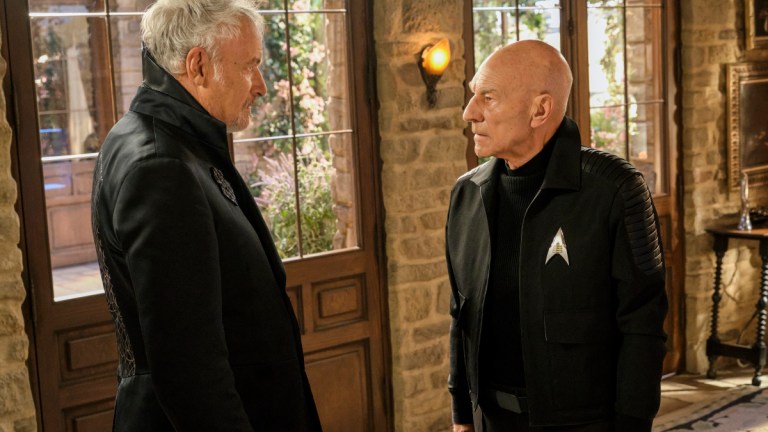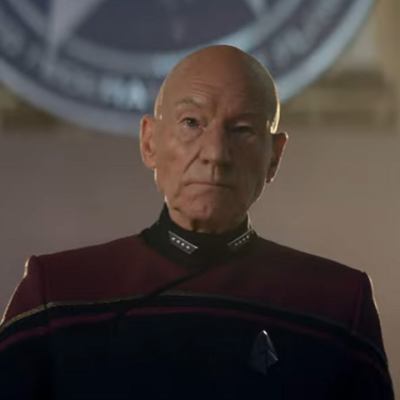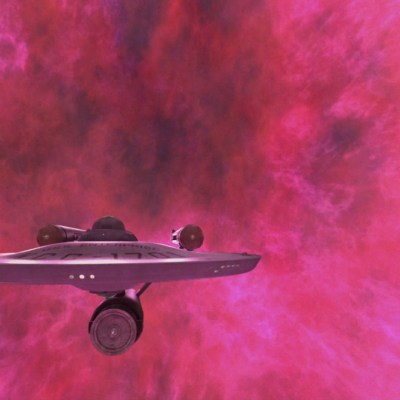Star Trek: Picard Season 2 Episode 1 Review: The Star Gazer
Star Trek: Picard returns to our screens doing the things it does best—and brings back two franchise favorites in the process.

Warning: This article contains STAR TREK: PICARD spoilers.
Star Trek: Picard Season 2 Episode 1
For all the bluster and bleakness of its initial trailers and promos surrounding the Star Trek: Picard Season 2 premiere, the actual episode itself is a fairly low-key return for the show. To be clear: “The Star Gazer” is largely excellent, offering us rich and rewarding character moments and the return of several old faces from our collective Star Trek: The Next Generation days, even as it sets up what are ostensibly the main arcs of the season. But it does very much take its time getting going, and if you were waiting on the edge of your seat for things the Season 2 trailers promised (what appears to be time travel, the return of John de Lancie’s famous badass god-being Q), well, you were waiting a while.
Instead, “The Star Gazer” is an episode that looks inward before it ever begins to plot outward, and Picard as a whole remains a show that is much more concerned with themes and ideas than it is specific story beats or narrative explanations. (This isn’t a bad thing, by any stretch, but having this show and Star Trek: Discovery on at the same time is definitely something of a study in contrasts.) For example, the multiple meanings of the episode’s title—which references Picard’s childhood longing to go to the stars, his first Starfleet command, and the ship Rios captains now—works great thematically throughout the hour, and there’s a certain sense that Picard’s arc will follow a similar pattern of looking backward and forward at the same time.
There’s a certain Shakespearean aspect to the Picard character we meet in the Season 2 premiere, a man who—though Picard itself almost plays down many of the biggest game-changing elements from the Season 1 finale—doesn’t know quite who this new version of himself is. The idea that becoming a synth has changed him in some significant way is implied but never directly stated, and if, for whatever reason, you only started watching this show at this particular moment, you might not even catch that there’s anything, well, let’s just say not entirely human about him. (To be fair, the show was incredibly vague about how that would all play out anyway. But still.)
Admittedly, I’m not entirely sure that I buy the idea that Picard has spent his life so obsessed with the allure of exploring the stars that he’s closed off his heart to love and emotional connection. Even if you ignore his handful of Next Generation flings or the literal years of shared sexual tension with Beverly Crusher, there are still many other multiple worthwhile kinds of love and intimacy that matter just as much as romance or sexual attraction. So the idea that Picard’s life has somehow been an empty one because he doesn’t have a wife or girlfriend in it when he was surrounded by so many of these other kinds of deeply important connections is…well, let’s just say not entirely something I agree with.
But, thankfully, Patrick Stewart can honestly sell me anything, and if he wants me to believe that Jean-Luc Picard is having some sort of existential romantic crisis because reasons, well, I guess I’m here for it. Plus, I 100% support the idea that even though he is pushing 100 years old at this point, people everywhere just still want to mack on Picard. (Even Lahris the apparently recently widowed Romulan who wants to honor her dead husband Zhaban by romancing her boss/business partner/however this whole Chateau Picard situation works.) And the idea that he still deals with these sorts of problems by heading to a bar to get drunk with Guinan. For what it’s worth, Whoopi Goldberg’s return is pitch-perfect, and if this whole episode had just been the two of them getting sloppy and gossiping that would have been totally fine.
Of course, the Picard premiere has bigger issues to wrestle with than the question of Jean-Luc’s love life and subsequent mental state. After a rapid-fire catch up with our La Sirena faves—Raffi and Seven of Nine’s relationship is still very firmly in the “it’s complicated” category, Dahj is some sort of synth diplomat, Elnor (still hot) is joining Starfleet, and Rios is a captain in his own right—everyone is suddenly brought together thanks to the appearance of a strange space anomaly (very different from the one wreaking havoc over on Discovery, thank goodness.) This is caused by something that can apparently rip holes in the very fabric of space-time and between the incredibly advanced technology and the very obvious bright green glow, I truly have no idea how it took everybody so long to figure out the Borg were involved.
Many of the best moments of Picard Season 1 were centered around the Borg in some way—Picard’s still-lingering trauma from his assimilation, Seven’s struggle to make a life for herself outside of the shadow of her Borg status, the Artifact that Hugh and his team excavating—so the fact that so much of this season feels like it will also involve the Borg is very exciting. Particularly because “The Star Gazer” is already asking the best kinds of Star Trek questions: At what point, if any, do these beings that I have long considered my worst enemies deserve a second chance?
After all, Klingons and Romulans now both play a key role in the world of the Federation and Starfleet, and both were once humanity’s deadliest adversaries. Of course, this is the Borg we’re talking about, and the idea that this species, who have done such harm to characters we care so deeply about, could ever be part of the Federation is on its face fairly repulsive. But…isn’t that exactly the kind of lesson Picard the man and Picard the show have repeatedly asked us to wrestle with? Plus, the fact that the (admittedly extremely awesome looking) faceless Borg Queen manages to drop Picard’s lifelong “look up” mantra just before the Stargazer blows up is certainly a hint that something bigger than we understand is going on.
Which, of course, brings us to the Q of it all. Look, John de Lancie’s return is everything we could have possibly wanted it to be in the scant minutes of screentime we’re given this week. He is basically the very definition of “still got it”. And truly, the nod to the fact that we’re all a bit older now and therefore even the immortal Q needed to be aged up a little bit to “match” his nemesis Picard was absolutely perfect.
Given the changes at Chateau Picard during the episode’s final moments, it’s clear that we’re in some sort of alternate timeline or alternate universe, but what exactly has happened, why Q has chosen this moment to involve himself in his old nemesis’ life (or death, depending on how you view the Stargazer’s explosion) or what Picard’s meant to do in this legitimately alien new world are all unclear. But I can’t wait to find out some of the answers.


